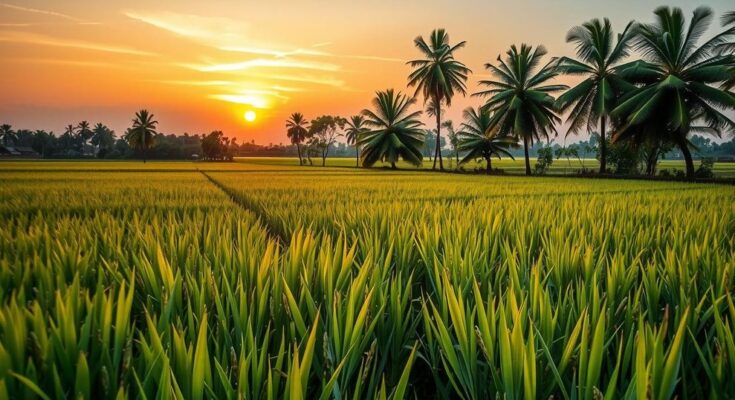Mozambique has set a record for rice imports in 2024, spending US$441 million, a 38.8% increase from 2023. This rise results from decreased local production amid increasing consumption. Declines in maize, sorghum, and millet production exacerbate the situation, raising concerns about food security. Experts advocate for long-term governmental investments to enhance agricultural resilience and reduce dependency on imports.
In 2024, Mozambique reached a troubling new benchmark in rice imports, indicating an increased dependency on foreign sources for essential food supplies. The Bank of Mozambique (BdM) reported that the nation expended approximately US$441 million on rice imports, reflecting a striking 38.8% rise from 2023’s US$317.7 million. This increase is attributed to heightened domestic consumption alongside a decrease in local rice production due to various agricultural challenges.
The National Institute of Statistics (INE) indicated that rice production in 2023 plummeted by 34% to just 161,800 tons compared to the previous year. This decline is mirrored in other agricultural outputs, driven largely by adverse climatic events such as floods and droughts, compounded by inadequate investments in irrigation, high-quality seeds, and technical support.
To offset this production shortfall, Mozambique has increasingly relied on imports, leading to heightened exposure to global food price fluctuations and exacerbating food insecurity for vulnerable populations. The maize sector also experienced a decline in 2023, with production falling 11% to 2.12 million tonnes, although this drop is less pressing given the high yields of 2022.
Moreover, significant reductions were observed in the production of sorghum and millet, with sorghum decreasing by 15% to 139,553 tonnes and millet declining by 32% to 17,098 tonnes. The combination of these dramatic production decreases and the record-high imports raises alarm in a nation where the agricultural sector constitutes over 20% of GDP.
Despite the adverse climatic conditions, Mozambique has the potential to enhance agricultural production through strategic governmental investment. A report from the Inclusive Growth in Mozambique development programme emphasizes the urgent need for systematic investments to improve climatic and structural factors, thereby reducing reliance on costly imports and fostering income, job creation, and enhanced food security for millions of Mozambicans, ultimately strengthening the economy.
The rising rice imports in Mozambique underscore a critical dependence on foreign food sources, driven by substantial declines in local agricultural production. Significant drops in rice, maize, sorghum, and millet production highlight the vulnerabilities faced by the agricultural sector due to climatic challenges and insufficient investments. However, focused long-term governmental investments could provide pathways to improve agricultural outputs, reducing import reliance while bolstering food security and economic stability.
Original Source: macaonews.org




